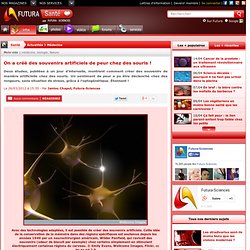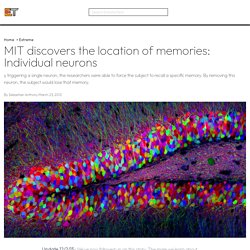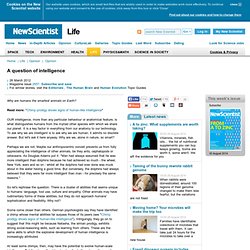

On a créé des souvenirs artificiels de peur chez des souris ! Avec des technologies adaptées, il est possible de créer des souvenirs artificiels.

Cette idée de la conservation de la mémoire dans des régions spécifiques est soutenue depuis les années 1940 par un neurochirurgien américain, Wilder Penfield, qui ravivait des souvenirs (odeur de biscuit par exemple) chez certains simplement en stimulant électriquement certaines régions du cerveau. © Emily Evans, Wellcome Images, Flickr, cc by nc nd 2.0 On a créé des souvenirs artificiels de peur chez des souris ! - 2 Photos On pourrait croire qu’on nage en pleine science-fiction. Pourtant non. Cette prouesse, on la doit à deux équipes de chercheurs qui ont travaillé indépendamment avec différentes méthodes, aboutissant à un résultat analogue. L’optogénétique fait la lumière sur la peur Commençons donc dans l’ordre chronologie. Pour cette étude, les souris produisaient cette molécule particulière lors des processus de mémorisation.
On a recréé des souvenirs liés à la peur chez des souris. MIT discovers the location of memories: Individual neurons. Update 12/2/15: We’ve now followed up on this story: The more we learn about memory, the weirder it gets.

The original continues below. MIT researchers have shown, for the first time ever, that memories are stored in specific brain cells. By triggering a small cluster of neurons, the researchers were able to force the subject to recall a specific memory. By removing these neurons, the subject would lose that memory. As you can imagine, the trick here is activating individual neurons, which are incredibly small and not really the kind of thing you can attach electrodes to. Now, just to temper your excitement, we should note that MIT’s subjects in this case are mice — but it’s very, very likely that the human brain functions in the same way. In the experiment, MIT gave mice an electric shock to create a fear memory in the hippocampus region of the brain (pictured above) — and then later, using laser light, activated the neurons where the memory was stored.
A question of intelligence - life - 26 March 2012. Why are humans the smartest animals on Earth?

Read more: "Chimp prodigy shows signs of human-like intelligence" OUR intelligence, more than any particular behaviour or anatomical feature, is what distinguishes humans from the myriad other species with which we share our planet. It is a key factor in everything from our anatomy to our technology. To ask why we are intelligent is to ask why we are human; it admits no discrete answer. But let's ask it here anyway. Perhaps we are not. So let's rephrase the question. Some come closer than others. At least some chimps, then, may have the potential to evolve human-scale intelligence. Some did, but a long time ago: our own ancestors. So our ancestors may have been fortuitously placed to embark on the runaway cycle of biological and cultural development that led to modern, multitasking humans (see "Puzzles of evolution: Why aren't we more like chimps?
") Yet we should beware of hubris. New Scientist Not just a website! More From New Scientist.